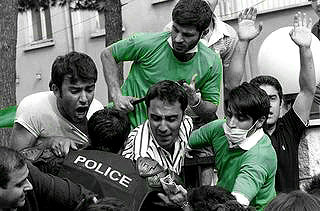 If the Iranian regime successfully beats back the challenge of Mir Hussein Mousavi and millions of protesters, what happens next? Matt Yglesias says it makes engagement with Iran impossible:
If the Iranian regime successfully beats back the challenge of Mir Hussein Mousavi and millions of protesters, what happens next? Matt Yglesias says it makes engagement with Iran impossible:
The hope behind an engagement strategy was that the Supreme Leader might be inclined to side with the more pragmatic actors inside the system—guys like former president Rafsanjani and former prime minister Mousavi. With those people, and most of the Iranian elites of their ilk, now in open opposition to the regime, any crackdown would almost by definition entail the sidelining of the people who might be interested in a deal. Iran would essentially be in the hands of the most hardline figures, people who just don’t seem interested in improving relations with other countries.
But what if Mousavi wins? Jonah Goldberg says it doesn’t matter:
If the forces of reform and democracy win, Obama’s plan to negotiate with the regime is moot, for the regime will be gone. And if the forces of reform are crushed into submission by the regime, Obama’s plan is moot, because the regime will still be there.
Put me on Matt’s side. If Khamenei wins, Obama’s engagement policy probably becomes impossible, both on practical and moral terms. But if Khamenei falls, what’s the problem? Sure, “the regime will be gone,” but there will be a new regime in its place. Engagement would most likely be on hold for a while as it finds its feet, and it’s possible that even in the longer term the new regime would find it impossible to negotiate with the U.S. But it’s also possible that they’d be more likely to negotiate with the U.S. We don’t know, and neither does Goldberg, who never explains why he thinks Obama would find it impossible to engage with a new regime in Iran. He just seems to hope it’s true.

















